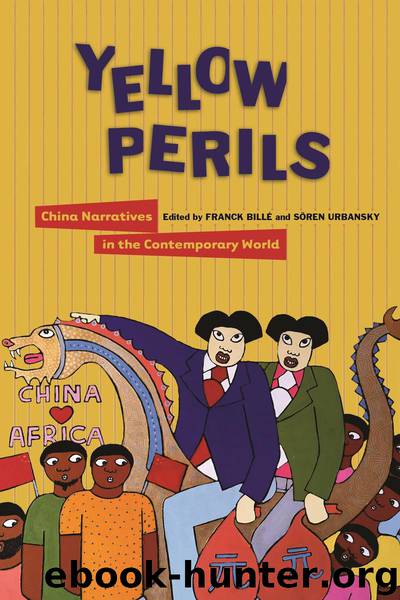Yellow Perils by Unknown

Author:Unknown
Language: eng
Format: epub
Publisher: University of Hawaii Press
Published: 2018-07-30T16:00:00+00:00
CHAPTER 6
“The Chinese are Coming”
Social Dependence and Entrepreneurial Ethics in Postcolonial Nigeria
YU QIU
China: A friend or a neo-colonizer of Africa?
In 1971, a bilateral diplomatic relationship between China and Nigeria was established, under the ideological roof of “Sino–Africa friendship.” This diplomatic tie with Nigeria is part of China’s strategy of alliance with many African countries, promoting solidarity among those developing countries that share struggles against imperialism and colonialism. It was a diplomatic strategy deployed at a time when an internationally isolated China strove for international recognition from Africa, against the objections of the West (led by the US) and the Soviet Union. 1 In the 2000s, after a period of absence, the Sino-African friendship discourse reappeared in official diplomacy and media in China. While the old friendship discourse was aimed mainly at mobilizing revolutionary sentimentality, this new form is essentially about collaboration based on shared interests. 2 Indeed, as China’s second largest trading partner in Africa, Nigeria has a longstanding position in China’s international trade. In past decades, the volume of China–Nigeria trade increased drastically, from $10 million in 1971 to $13 billion in 2015. The majority of trade exchange consisted of China’s import of oil and natural gas, along with export of telecommunications and textile production. 3
The Chinese state’s efforts to befriend Africa have provoked critiques and doubts. Many scholars point out sharply that China’s renewed engagement with Africa, which is portrayed as different from its relationship with the West, remains rather rhetorical and hard to fulfill (Alden and Large 2011), and that at its core, the engagement is an economically driven turn to the global South (Strauss 2013). In a simplistic sense, the more China projects a seemingly profound love of Africa based on equality and mutual trust, the less convincing it is that this love can consist of solely one-directional affection, with no request for a reciprocal return of “love.”
Moreover, China’s increasingly prevalent presence in Africa is seen as a threat to the West’s once-secure influence on the African continent and to its access to natural and geopolitical resources in Africa (Sautman and Yan 2006). 4 In this particular form of “Yellow Peril” discourse, China is portrayed as a “neo-colonizer,” and the essential fear hidden in such an accusation is of China becoming such an exploitative superpower that its economic cooperation–centered policies will override Africa’s economic and political autonomy and independence. The economic and commercial proximity that China has established with many African states also becomes a moral anchor for a larger story about Euro-America’s hardcore economic and political interests and “proper” transnational collaboration in postcolonial Africa, as it is blatantly defined by the Western countries. Yet, in spite of the fierce debate about China’s role in Africa, ironically Africa itself is reduced to a concept, an idea, and a muted “Other” to be loved, assisted, and exploited. This neglect of the African voice in global politics, however, does not mean that Africa remains marginalized, playing minimal roles in the global political economy. On the contrary, just as
Download
This site does not store any files on its server. We only index and link to content provided by other sites. Please contact the content providers to delete copyright contents if any and email us, we'll remove relevant links or contents immediately.
Call Me by Your Name by André Aciman(20516)
Ready Player One by Cline Ernest(14675)
How to Be a Bawse: A Guide to Conquering Life by Lilly Singh(7486)
Wiseguy by Nicholas Pileggi(5786)
The Kite Runner by Khaled Hosseini(5179)
On Writing A Memoir of the Craft by Stephen King(4944)
Audition by Ryu Murakami(4930)
The Crown by Robert Lacey(4817)
Call me by your name by Andre Aciman(4684)
Gerald's Game by Stephen King(4654)
Harry Potter and the Cursed Child: The Journey by Harry Potter Theatrical Productions(4506)
Dialogue by Robert McKee(4404)
The Perils of Being Moderately Famous by Soha Ali Khan(4220)
Dynamic Alignment Through Imagery by Eric Franklin(4217)
Apollo 8 by Jeffrey Kluger(3709)
The Inner Game of Tennis by W. Timothy Gallwey(3687)
Seriously... I'm Kidding by Ellen DeGeneres(3633)
How to be Champion: My Autobiography by Sarah Millican(3593)
Darker by E L James(3516)
